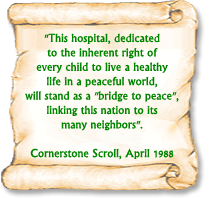page content
Skip page contentA Bridge to Peace
Reaching Out
Some 30% of Schneider Children's patients come from the Arab sectors of Israel or from neighboring countries in the Middle East. Schneider Children’s not only extends a welcome hand to Muslim children in need in the realization of peace, co-existence and mutual respect, but also ensures them the best pediatric care available.
Professional Cooperation
Schneider Children's views multilevel interchange and advanced education as a top outreach priority. By providing training to medical professionals both in Israel and abroad, Schneider Children’s can contribute towards the improved care of children worldwide. This approach has even more importance when institutions and personnel emanate from Israel’s neighbor, the Palestinian Authority (PA), because the greater the hospital’s impact upon the humanitarian and personal levels, the greater the hopes for improved cooperation and understanding on the national level.
Quality, open and ongoing communication and cooperation between Schneider Children’s and the PA engenders:
.jpg) Mutual trust between neighbors
Mutual trust between neighbors .jpg) Improved professional capability for medical teams in the PA
Improved professional capability for medical teams in the PA.jpg) Better care for Palestinian children
Better care for Palestinian children.jpg) The groundwork for broader collaboration throughout the Palestinian Authority in the future
The groundwork for broader collaboration throughout the Palestinian Authority in the future
Over recent years, PA doctors have undergone advanced training in the fields of intensive care, urology and nephrology. A physician from Gaza who underwent advanced training over one year in oncology, still maintains close contact with his colleagues at Schneider.
Equal Treatment
Acknowledging that all children are equal, Schneider Children's has evolved a policy of multidisciplinary treatment alongside integrated supportive care programs, which are geared to the specific requirements of the Arab youngster and his family. Schneider Children's Arabic speaking professionals contribute towards improved understanding and better communication, and advance equality in the areas of human and civil rights.
Similarly, there is no distinction in children's wards based on nationality or language. Palestinian or Israeli Arab children are hospitalized alongside their Jewish peers, and families intermingle daily helping to break down barriers. The only concern of the medical center is that each child and his family receive the finest treatment available.
| ||||||






.jpg?BannerID=98)



.jpg?BannerID=97)

.jpg?BannerID=96)